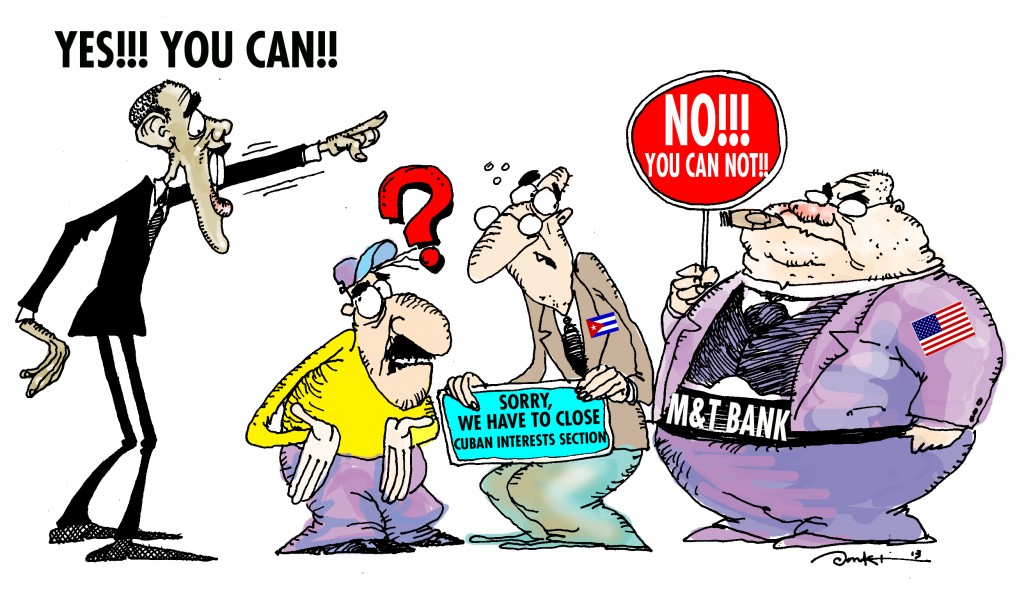
Suspension of U.S.-to-Cuba travel creates holiday heartbreak
Even those who thought they had seen it all in the bizarre world of U.S.-Cuba relations, were surprised last month by an unexpected and surreal new twist.
On Nov. 26, just in time for Christmas, when hundreds of thousands of Cuban-Americans go back to the island to spend the holidays, the Cuban Interests Section in Washington announced the indefinite suspension of all consular activities, except for emergency and humanitarian cases.
The reason? The bank that Cuba was using, M&T Bank in Baltimore, cancelled their accounts and the Cubans have not been able to find a U.S. or international bank willing to handle their financial transactions.
As a result, Cuban-Americans cannot renew passports or get the required visas. The situation is bad for all the parties involved: the Cuban-Americans now stuck in the U.S.; Cuba that will lose millions in travel dollars, and the U.S. that is seeing Obama’s “people-to-people” policy in danger of unraveling.
“This doesn’t make any sense. I was planning on visiting (my aunt) Tía Isabel,” said María Isabel Alfonso, a Cuban-born literature professor who lives in Jackson Heights, Queens, pointing to a photo of a sweet-looking lady sitting on a rocking chair. “I wanted to go after Christmas. Tía Isabel hasn’t met my son Julián, who was born 18 months ago, and I wanted to take him with me and celebrate with friends and family. But now it seems I won’t be able to go.”
Alfonso, 41, a member of CAFE (Cuban Americans for Engagement), a group that promotes a rational U.S.-Cuba policy, teaches at St. Joseph’s College on Long Island. She has taken several trips to see her elderly aunt since 1995 — the year she moved to the U.S. Her predicament is shared by hundreds of thousands of Cuban-Americans, 200,000 of whom live in the New York metropolitan area. Last year, almost 400,000 visited their native country.
Havana put the blame for the strange situation squarely on the never-ending U.S. embargo, and on sanctions resulting from its gratuitous inclusion on the U.S. list of state sponsors of terrorism, which carries heavy regulations and huge fines.
“It is a risk no bank wants to take,” Alfonso said. “Even mistakes can cost them a lot of money.”
A lot of money is right. In June, Italy’s second-largest bank, Intesa San Paolo, paid $3 million over U.S. dollar transactions involving Cuba, Iran and Sudan. Last year, the Dutch bank ING Bank NV agreed to pay $619 million, the biggest fine ever against a bank for sanctions violation. Banks from Sweden and Great Britain have also paid out hundreds of millions more in fines involving Cuba transactions.
If anything, this quandary makes even more blatant the contradictions of U.S. policy toward Cuba.
Even though Obama said last month, “We have to update our policies. Keep in mind that when Castro came to power, I was just born,” his decision to allow unlimited visits by Cuban-Americans and to expand purposeful travel in order to promote change in the island is being sabotaged by his own anachronistic embargo policy. Talk about absurdity.
To make the whole episode even stranger, stopping diplomatic missions from having access to routine banking services is a violation of the Vienna Convention. This has forced the Obama administration to work with Cuba to find another bank, a rare instance of collaboration — unsuccessful so far — between the two neighbors.
Such fleeting cooperation, even if it ends up being successful, is not enough.
“Cuba should be removed from the list of terrorist countries,” Alfonso said. “It is time to lift the embargo, end all travel restrictions and normalize relations.”
The sooner the better.
(From the New York Daily News)


